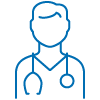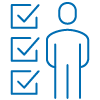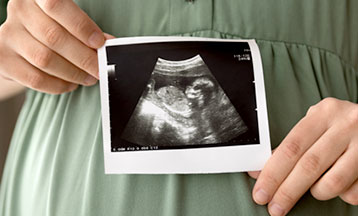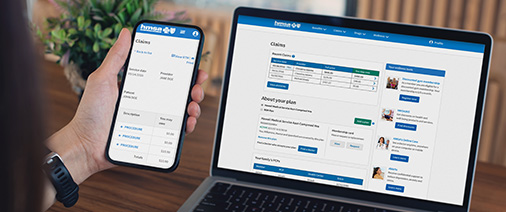Your journey through maternal health covers the stages before (pre-pregnancy), during (prenatal), and after pregnancy (postpartum). Each stage plays a critical role in your overall health and well-being.
While this should be an exciting time, it's OK to feel a bit overwhelmed or uncertain. We want to help you to be aware and prepared for the physical and emotional changes.
Learn about:
- How to be your best before pregnancy.
- Health conditions that might complicate pregnancy and childbirth as well as those that could affect your overall well-being.
- How to take care of yourself after your baby is born.
Every person is unique, as is every pregnancy and birth. That’s why it’s so important to connect with your health care team to ensure you're getting the care that's right for you.
Taking care of your health before conception increases your chances of a successful pregnancy. Learn how to boost your health and well-being before pregnancy.
A healthy baby starts with a healthy you!
- You may plan on seeing a doctor and making lifestyle changes while pregnant. But it’s just as important to start making changes before you get pregnant, because having a healthy baby starts before you get pregnant.
- Pre-pregnancy health refers to the health of people during their reproductive years. It means knowing how health conditions and risk factors could affect a person and their unborn baby. Pre-pregnancy health can help:
- Improve your chances of getting pregnant.
- Prevent pregnancy complications.
- Get a pre-pregnancy or preconception checkup to make sure your body is ready for pregnancy.
Make a plan and take action
Here are some key things to do if you’re planning to get pregnant soon or sometime in the future:
- See your provider and schedule a pre-pregnancy checkup. Plan to discuss:
- Your health history and any medical conditions you currently have that may affect a pregnancy.
- Medications you’re taking, vaccinations that you should have, etc.
- Steps you can take before pregnancy.
- Create a pre-pregnancy planning checklist. Let’s get started.
- HMSA members: You do NOT need a referral from your primary care provider to see a participating obstetrical or gynecological care professional, such as an ob-gyn or nurse midwife in your health plan network.
Helpful Links

Find a doctor
Need help finding a doctor? It’s beneficial to establish yourself as a patient with a doctor before getting pregnant.

My Account
Find out what’s covered under your health plan.

Need a language interpreter?
If you need a language interpreter, we have one for you.

Additional Resources
FAQs, your pregnancy checklist, glossary of terms, and other resources to help you.

Sign up to get more information
Get tips and guidance to stay at your healthiest before pregnancy.
Articles & Information

Taking Care of Yourself for Your Baby
Trying to Conceive
Things to Do Before Getting Pregnant
Getting Ready for Pregnancy
You just found out you’re pregnant! This could be exciting news, but also stressful. Figuring out what to do next may be quite overwhelming. HMSA is here to support you.
Prenatal care is very important for you and your baby’s health. Babies born to those who don’t get prenatal care are three times more likely to be born with low birth weight and five times more likely not to survive. People who regularly go to all their prenatal visits have a better chance of detecting health problems that could be treated early. Early treatment can resolve many problems and prevent many others. Learn more about prenatal care checkups.
Make a Plan and Take Action
- Call your ob-gyn or other health care provider to schedule your first prenatal visit. If you don’t have an ob-gyn, use the Find a Doctor tool to find a provider or contact HMSA. Search terms that you could look for:
- Obstetrics or ob-gyn.
- Certified nurse midwife.
- Pregnancy.
- Baby.
**Most plans do not require a referral from your PCP to see a participating ob-gyn or health provider.
- Start taking prenatal vitamins with folic acid if you haven’t yet. Prenatal vitamins ensure that you have enough of the key nutrients in case you’re not getting them from your daily diet. Folic acid helps prevent neural tube defects like spina bifida (a spinal cord defect) and anencephaly (a brain defect). Learn more about folic acid
- Ensure a healthy lifestyle. Eating a balanced diet along with staying active and maintaining other healthy lifestyle habits will optimize a healthy pregnancy and a healthy baby. Learn more about eating healthy during pregnancy
- Need some guidance on what to do before baby comes? A checklist may help keep you on track with the things you need to do. Check out this Pregnancy Checklist [PDF] to help guide you through each trimester of your pregnancy.
- HMSA’s Pregnancy and Postpartum Support program (PAPPs) can help you have a healthy pregnancy by pairing you with your own nurse who’ll provide personalized education and counseling over the phone. The nurse provides additional services to complement the care you’ll receive from your ob-gyn or health provider for your prenatal care. This program is voluntary and there’s no cost for HMSA members. Learn more and enroll.
- Dental care during pregnancy is important. During pregnancy, your body goes through many changes. Those changes can affect your gums and teeth and can increase your risk of gum disease. Inflammation and infection of your gums can put you at risk for a preterm baby. The Oral Health for Total HealthSM program’s preventive dental services, outreach and education, and integrated medical care programs can improve your health and your baby's health.
Helpful Links

Find a doctor
Need help finding a doctor? It’s beneficial to establish yourself as a patient with a doctor before getting pregnant.

My Account
Find out what’s covered under your health plan.

Need a language interpreter?
If you need a language interpreter, we have one for you.

Additional Resources
FAQs, your pregnancy checklist, glossary of terms, and other resources to help you.
Articles & Information

Maternal Urgent Warning Signs
How well do you know about urgent warning signs that can indicate serious complications? Take a quiz


Baby’s Development
Coverage varies by health plan. Please refer to your Guide to Benefits or Member Handbook through the My Account page to find out what your plan covers. Examples include:
- Prenatal visits.
- Prenatal vitamins.
- Diagnostic tests (e.g., diagnostic amniocentesis, diagnostic ultrasound, diagnostic x-rays, diagnostic lab tests, etc.).
- Fetal stress and nonstress testing.
- Fetal development screenings.
- Delivery and services related to labor and delivery.
- Postpartum care.
- Breastfeeding support and counseling.
- Breast pumps.
- Lactation counseling.
Caring for Your Health and Well-being After Delivery
- Congratulations, your baby is here!
- While your baby needs a lot of love, care, and attention – now more than ever it’s important to be aware of your own body and take care of yourself too.
- The postpartum period, especially the first weeks after childbirth, is a time of adjustment and recovery.
- Often referred to as the critical “fourth trimester”, it’s the time to create a bond with your baby and adjust to life after delivery.
- It’s also important to listen to your body because the transition back to “normal” can vary greatly. Know that while many individuals have an uncomplicated recovery after giving birth, there is always the potential for postpartum complications. Some are temporary and minor, while others can be life threatening.
- Talk to your healthcare team and get the help and support you need physically and emotionally.
- Learn about the changes you’re going through and be aware of potential complications.
- There are “baby blues” and there is postpartum depression. It’s important to know the difference, and the warning signs. Learn more about the “baby blues”.
Make a Plan and Take Action
- Start on your postpartum healthcare, make an appointment to see your ob-gyn within 3 weeks of giving birth. Learn about postpartum visits, why they’re important, and what to expect.
- To help monitor and manage how you’re doing, create a Postpartum Care Checklist. Let’s get you started [PDF].
- Get personalized counseling and guidance during your postpartum period – with the HMSA Pregnancy and Postpartum Support Program.
Find out more about the postpartum care covered under your health plan. Here are some resources:
- My Account – online access to your health plan information.
- For HMSA QUEST Integration Members – Your member handbook provides information about your plan.
- HMSA members: You do NOT need a referral from your PCP to see a participating obstetrical or gynecological care professional, such as a gynecologist or certified nurse midwife in your health plan network.
Helpful Links

Find a doctor
Need help finding a doctor? It’s beneficial to establish yourself as a patient with a doctor before getting pregnant.

My Account
Find out what’s covered under your health plan.

Need a language interpreter?
If you need a language interpreter, we have one for you.

Additional Resources
FAQs, your pregnancy checklist, glossary of terms, and other resources to help you.
Articles & Information







